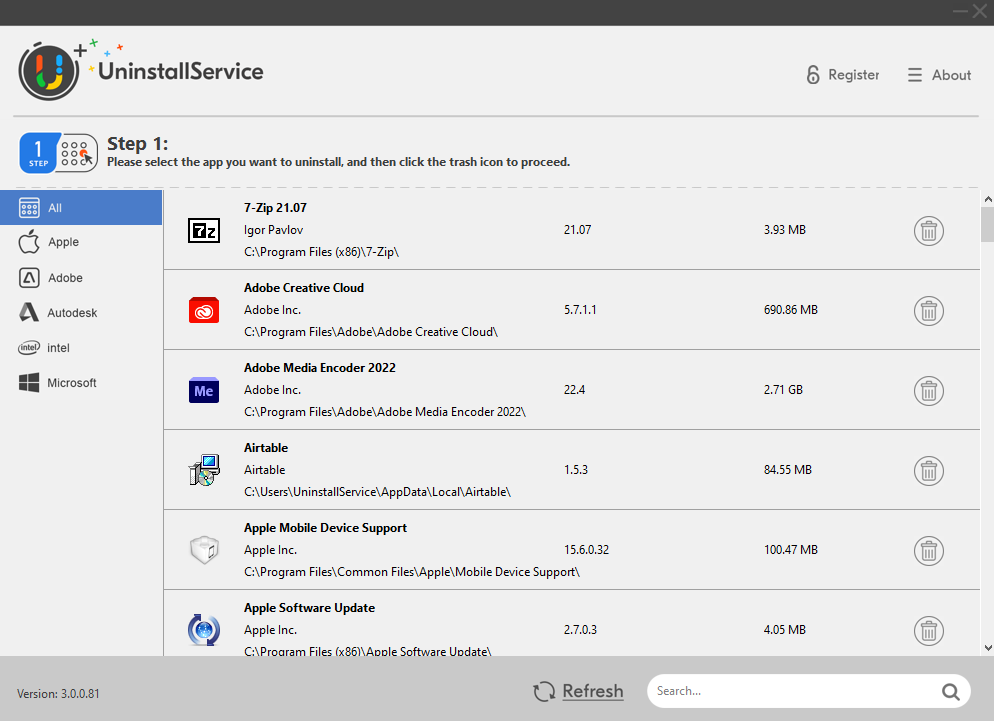How to Uninstall Vivaldi Classic Step by Step
Have you been looking for a solution to completely uninstall Vivaldi Classic? Is Vivaldi Classic poping up error message that you can't update or upgrade your current version due to incomplete uninstallation? Is the error message saying that you can't install Vivaldi Classic because of incompatibility with other apps that you're not adware of at all? Are the Vivaldi Classic and releted leftovers taking up large drive space and you don't know how to find and clean them up?
We'll guide you to resolve these issues by completely uninstalling Vivaldi Classic & associated leftovers. It is recommended that you use UninstallService, which is legit, cheap and well reviewed by professionals.
The word Windows is associated with many. It’s the world’s most popular personal computer operating system, it’s a part of every computer user’s arsenal, and the name ‘Windows’ itself is used to refer to the operating system in question. But what is a Windows program? A windows program like Vivaldi Classic is similar to an application in that they are programs that provide access to a computer’s system resources via an internet connection. However, unlike an application, a windows program doesn't take over your monitor or do anything other than perform its basic functions. As such, they're not limited by screen resolution or graphics card capabilities. The term ‘windows program’ might be a little misleading when applied to everyday computing devices like laptops and desktops that offer only simple graphics card and memory management options rather than the more powerful computers that come from manufacturers like MSI and UEFI platforms. There are several main differences between a software application (desktop) and a windows program (tablet). Read on for more information about these main differences and how computers like your default tablet or laptop have special access permissions for running Windows apps.
What is a Windows Program?
A ‘windows program’ Vivaldi Classic is essentially any program that offers access to device resources via an internet connection. While you can’t run an application directly from a windows machine, you can still access system resources (like memory, CPU/GPU resources) from a computer’s remote desktop or virtual machine host. These resources can be used by other programs, like web browser, email application, and calendar app.
How to Install and Start a Windows Program
You can get started installing Windows on a computer running any of the following. For more information, see How to Install Windows on a Windows 7, Windows 8, or Windows 10 Computer. Use an online store like Microsoft Store or Google play to download the latest software for your computer. Most of the software you download from the internet stores in your computer’s micro-system (usually called an ‘appstore’), which you can then use to add and remove applications and features from at any time. You can also download free versions of most apps on your computer that have a default setting to stay ‘open source’ (meaning they’re able to run as a service on the internet).
Differences between Computer Software and Windows Program
The main difference between computer software and windows program is that a windows program can run as a program that’s designed to run on a Windows computer, while a computer program can only run on a computer that’s been setup as a windows machine. On the other side, a computer program only has access to limited resources (usually memory and CPU) when running on a Windows computer; it can’t fully run on its own. This is because a computer can only run one version of each application (and their extensions) at a time. A typical example of this is with a web browser: when you use a web browser from a Windows computer, you have access to all the features from the default browser (Safari, Chrome, Bing, Internet Explorer, etc.) but not the extensions for other popular browsers like Firefox or Google Chrome. A windows program can’t run in the background and have access to these features.
How to Get to Know Your Computer Manufacturer
Before you can get started installing and uninstalling Vivaldi Classic and other programs, you’ll need to get to know your computer manufacturer. The good news is that most laptop and desktop computer manufacturers get right to the point when it comes to operating system support and security, so you shouldn’t have to do too much research before purchasing a machine. However, you shouldn’t forget that there are a few exceptions to this rule. For example, HP and Lenovo computers support Windows 10 while making do with XP as the default operating system. You can also find advanced models with a built-in combination of hardware and software that offers better flexibility and performance than the default model, but is limited in the apps and features it offers.
How to Uninstall Vivaldi Classic Manually Step by Step
- Go to Vivaldi Classic's official website and get Vivaldi Classic.exe. Open with the option administrator Run.
- You need to begin your computer in safe mode. Then run the utility and identify the place of the Vivaldi Classic program file in the next window or leave the default is correct. Then click Uninstall.
- Wait for the process to complete. It may take some time. In the end, you need to restart your computer.
How to Uninstall Vivaldi Classic Automatically
Using UninstallService to uninstall Vivaldi Classic is proven to be effective and very simple. With a few simple-to-follow steps, the Vivaldi Classic app will be thoroughly uninstalled and the leftovers completely removed.
